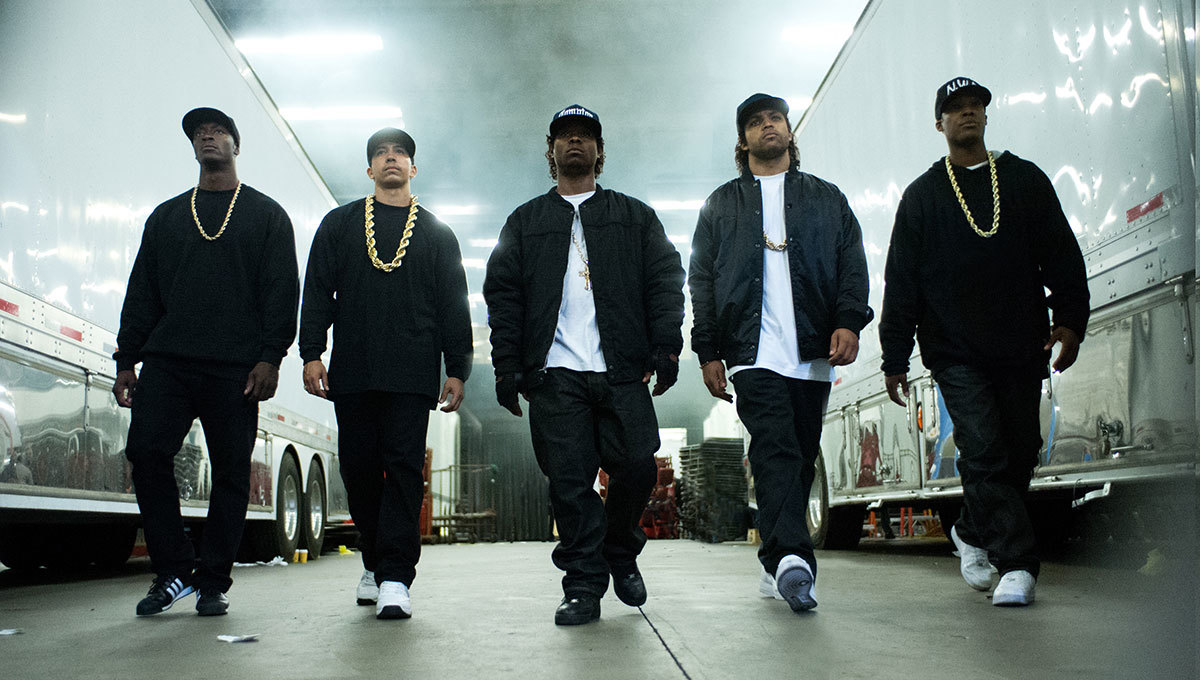
In Compton, in the mid-80s, the policy wasn’t so much “stop and frisk” as “stop, throw to the ground, and forcibly slap handcuffs on.” This was the same L.A. that, in 1992, would spark the riots in the wake of Rodney King’s brutal attack at the hands of the police. To put it mildly, it was not a safe or happy place to be a young black man.
But friends Dr. Dre (Corey Hawkins) and Ice Cube (O’Shea Jackson Jr., Cube’s real son and a dead-ringer for his dad) found refuge in music. Dre was incredible at spinning, mixing, and producing; Ice Cube was a gifted rapper/poet. Cube poured his feelings and observations about police brutality into his rhymes, which made him pretty unique at the time, when most rap music was about partying and making money. Dre and Cube sensed their music was going to speak to the disenfranchised kids they knew. They recruited their friend, the hustler and drug dealer Eazy-E (Jason Mitchell), to help them release a single.
In a brilliant (if somewhat surprising) choice, director F. Gary Gray chose to focus his film largely on Eazy-E. This works partly because Mitchell depicts E with such conviction and charisma, and partly because E’s story is such a uniquely American tragedy. Eazy-E wasn’t even supposed to be on the single, but one day he got behind the mic in the studio and—egged on by Dre, who told him to keep it real—found that he had a distinctive voice and a talent for connecting to the lyrics.
Along with two other friends, M.C. Ren (Aldis Hodge) and DJ Yella (Neil Brown Jr.), the young men formed N.W.A. (if you don’t know what that stands for, ask your mother). They mostly played local clubs until one day they were discovered by Jerry Heller (Paul Giamatti), a somewhat washed-up music manager, who heard the first single and recognized their talent. But Heller also made a fateful mistake—he hitched his cart to Eazy-E, pegging him as the group’s natural leader, but not realizing that he was hardly its biggest talent (those distinctions went to Cube and Dre). Heller closed ranks on E, flattering him, wining and dining him, while paying lip-service to the big contracts he was supposedly drawing up for the other guys in the group.
Meanwhile, N.W.A. went on tour, playing packed arenas—making headlines and causing a bit of white panic along the way. In Detroit, they were specifically told not to play their hit song, “F— the police”—but they cheerfully defied that order and were arrested, exchanging sneaky grins as their fans screamed at the cops and threw things at the police wagon. (The scene somewhat echoes a similar scene in Oliver Stone’s The Doors, where Jim Morrison is arrested for indecency. Plus ça change…)
Of course, there were parties, booze, weed, and even more women. But it wasn’t all fun and games. Midway through the tour, Dre got a phone call that his little brother had died after being jumped. The band members pledged fealty to each other—they would be Dre’s new brothers.
But when the tour ended, both Ice Cube and Dre grew increasingly frustrated with Heller—and his stronghold on E—and left to start their own ventures.
I’ve spent a lot of time asking myself if the depiction of Heller here is anti-Semitic. (I mention it because Ice Cube famously wrote a dis track about Eazy and Heller that contained anti-Semitic lyrics). Giamatti plays him as he’s written—as neither monster nor savior. He was a predator, who cheated the young men—even his beloved Eazy-E—out of a lot money. (He claimed it was just the nature of the business.) But the film also shows that he was a visionary, who recognized the group’s greatness, and a civil rights ally, who raged against the cops for their systemic racism. And, in his own twisted way, he loved Eazy like a son. I’d say the film narrowly manages to skirt that charge.
Of course, by alienating the rest of the group, Heller had sorely miscalculated. Ice Cube went on to put out several successful rap albums and star in the iconic film, Boyz in the Hood. Dre joined forces with the notorious Suge Knight and discovered the likes of Snoop Dogg and Tupac Shakur, before parting ways with Knight. He also released one of the most influential rap albums of all time, “The Chronic.”
As for Eazy-E, often dubbed “The Godfather of Gangsta Rap,” his story was much less triumphant. He went semi-broke, faded from public consciousness, and broke ties with Heller far too late. At the film’s end, he reconnects with Cube and Dre—there’s even talk of a N.W.A. reunion—and then is diagnosed with aggressive H.I.V. In 1995, H.I.V. was still a veritable death sentence. He died a few months later at the age of 31.
In some ways, Straight Outta Compton plays like a traditional musical biopic—we have the rise, a period marked by youthful excess, the break-up, and the reconciliation. But the backdrop of Rodney King-era L.A and the realness and rawness of N.W.A.’s music, not to mention the passionate and heartfelt performances of the film’s three young leads gives the film an undeniable power. Dr. Dre, Ice Cube, and Eazy-E were loudly proclaiming, Our Black Lives Matter—and you better listen up.
